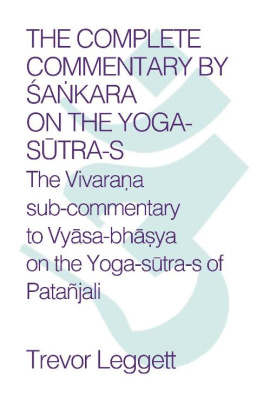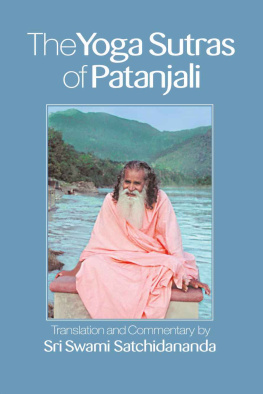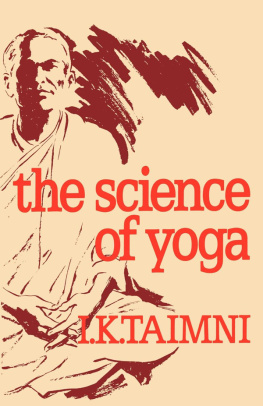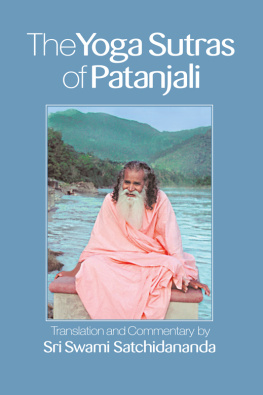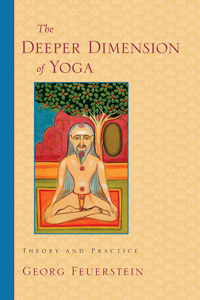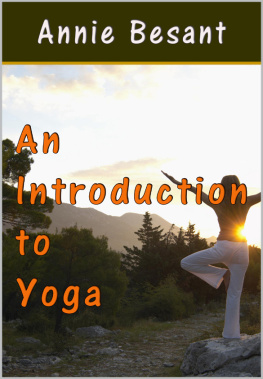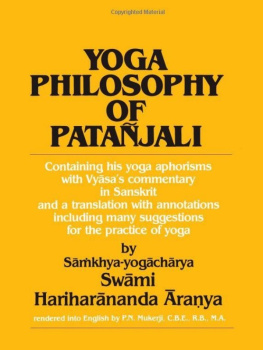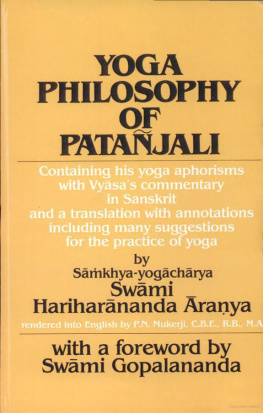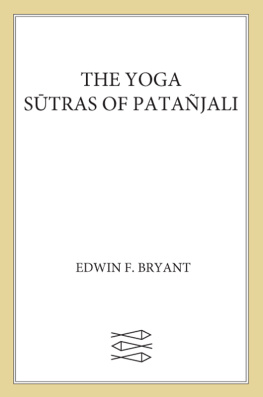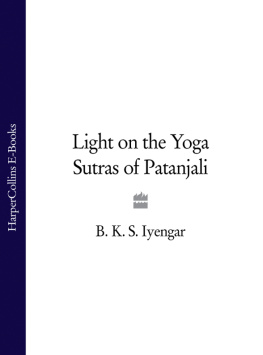Postal Address of the Trust:
Trevor Leggett Adhyatma Yoga Trust
PO Box 362
KINGS LYNN
PE31 8WQ
United Kingdom
Website address of the Trust:
www.tlayt.org
Copyright 2016 Trevor Leggett Adhyatma Yoga Trust
Printed edition first published in 1990 by Kegan Paul International Ltd
All rights reserved
No part of this publication may be reproduced or distributed in any form or by any means, or stored in a data base or retrieval system, without the prior written permission of the publisher Trevor Leggett Adhyatma Yoga Trust, except for the quotation of brief passages in criticism.
Printed in the United Kingdom
ISBN - 978-1-911467-04-5

Trevor Leggett Adhyatma Yoga Trust
To the late Hari Prasad Shastri, pandit and jani of India, translator of akaras works and a faithful follower of akara in his own original works, this translation is reverently dedicated
Acknowledgements
I am grateful to Dr. Hajime Nakamura, Professor Emeritus of the University of Tokyo and founder of the Eastern Institute, Tokyo, for help with the translation of the First Part. For errors that remain I am entirely responsible.
The late Shankaracarya of Sringeri, H.H. Abhinava Vidyatirtha, showed much interest in this Vivaraa and encouraged the present translator to tackle this difficult text, which (he said) might be of great importance in the study of akara.
The trustees of the Trevor Leggett Adhyatma Yoga Trust wish to express their grateful thanks to Dr Kengo Harimoto of Mahidol University,Thailand, who kindly agreed to write a Foreword to this E-book edition of The Complete Commentary by akara on the Yoga Sutras, translated by Trevor Pryce Leggett. Dr Harimotos most valuable and interesting Foreword reviews and puts in context some of the comments that have been made on the authors translation since it was first published in London in 1990 and also on the authenticity of the Vivaraa as a work by akara.
Contents
(Stra IV. 14, continued)
Foreword by Kengo Harimoto
When Trevor Leggett published The Complete Commentary by akara on the Yoga stra-s in 1990, it was the first full translation of the sub-commentary on the Yogastras, variously called the Yogastrabhyavivaraa or the Ptajalayogastravivaraa, etc., into a modern language. The Sanskrit text (henceforth the Vivaraa) had attracted some attention from Western scholars from the time it was published in Madras in 1952 as part of the Madras Government Oriental Series, especially because the editors of the edition ascribed it to one of the most famous of Indian philosophers, akara.
Hajime Nakamura, by translating whose work from Japanese into English Leggett had become known among Indologists, was one of those who were interested in the Vivaraa. Nakamura wrote a few articles on the Vivaraa in the late 1970s, mainly concerned with its authorship. He also published a Japanese translation of its first chapter from 1979 to 1983. I imagine that Leggetts interest in the Vivaraa was inspired by Nakamura.
Despite Leggetts long-term relationship with him, I do not see any evidence of the direct indebtedness of his English translation to Nakamuras Japanese translation. For example, in the Vivaraa towards the beginning of the commentary on Yogabhya 1.6, there is a question from an opponent: atha svaviayasmanyavievabhsanasmarthye rotrdn cittasya ca kimktam vievadhraaprdhnyam iti. Leggett translates this as A sense like hearing, and the mind, can reflect both the universality (i.e. class) and the particularity of an object; why is this supposed to be concerned mainly with determining a particular? Nakamura in Japanese translates in effect Senses, such as hearing, etc., can...; why is the mind...? The difference lies in how these two translators understood the function of the particle ca (and). This particle has various functions in Sanskrit. One is to combine two or more items (typically words) by being placed after the last word of the sequence. So, A, B, C ca means A, B, and C. It can also serve to connect sentences by being placed after the first word or syntagma of the following sentence. Leggett read the particle ca in the sentence as a word connector, combining rotrdnm and cittasya, whereas Nakamura read it as a sentence connector. I think that Leggetts understanding of the particles function here is preferable. Since such instances are frequent, I conclude that Leggetts translation was his own original work.
The whole translation is remarkable in that it was prepared by someone primarily known for his works related to Japan. I am amazed that Leggett learned Sanskrit on his own. He had apparently read quite a few other works in the original Sanskrit. This is evident from the references to Sanskrit works in the introduction.
After its publication two reviews appeared in academic journals. One was a review article entitled Notes on an English Translation of the Yogastrabhyavivaraa by Tuvia Gelblum in the Bulletin of the School of Oriental and African Studies, University of London, vol. 55 (1992) and the other, which was by J. W. de Jong, came out in the Indo-Iranian Journal 37 (1994).
Since I find the Notes by Gelblum to be unjustifiably critical of Leggetts book, I would like to point out some of the problems in them in this Foreword.
Gelblum appears to have misunderstood Leggetts position with regard to the authorship problem of the Vivaraa. He treats it as if Leggett was convinced of the identity of akara with the author of the Vivaraa, and he is critical of this view. In particular, he seems convinced that Leggett follows Hackers conversion theory (namely that akara was a follower of the yoga traditionwhatever that meansbut subsequently became a Vedntin). He even includes a digression mentioning a post-Biblical legend concerning Jethros conversion. What I read in Leggetts text, however, is that, although he was very much inclined to accept that akara and the author of the Vivaraa were one and the same, he still remained cautious about this. Leggett points out a swing towards Vednta in the Vivaraa; if he had been thinking only of a single authors evolution from being a scholar of Yoga to becoming a scholar of Vednta, he would have been concerned only with the Yoga elements in akaras Vednta works. That was what Hacker did. The fact that Leggett did not do this indicates that, while not committing himself to akaras authorship of the Vivaraa, he did not preclude the possibility that akara, a Vednta scholar, wrote the Yoga commentary.
Gelblums Notes include what he regarded as an example of a portion of the text of the Vivaraa where it could inform us of the existence of a superior original reading of the Yogabhya (3.14). However, the place which he chose was not a good example. As Gelblum himself appears to be aware, the author of the Vivaraa was most likely proposing an emendation to the text, because he first refers to a reading close to, but not the same as, what is found in published editions of the Yogabhya. The author shows a preference for another reading and explains why he prefers it. It seems to me as if the first reading was all he knew and he did not like it. If in fact he had had two readings before him, then he would have interpreted the preferred reading first and mentioned the alternative reading second. At least, when an author does this, we are less likely to doubt that he saw the alternative reading. The proposal by the author of the Vivaraa may or may not reflect the transmission history of the Yogabhya (namely that its reading had changed), but there is no guarantee that the author of the Vivaraa saw the alternative preferred reading in a manuscript.

